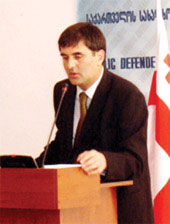Parliament dismisses ombudsman’s human rights report
By Shorena Labadze
Thursday, July 17

Ruling party MP Giorgi Gabashvili said the report was “based on rumours.”
“This is a one-sided evaluation of the events and is similar to opposition members’ opinions. Any report which isn’t based on facts is incompetent,” Gabashvili said in the parliamentary session. “The majority expected the human rights situation would be pictured more seriously in the report, but there is only criticism of the government.”
The report, which the previous parliament shelved citing time constraints, was delivered to lawmakers, briefly discussed and set aside within a single session.
The extensive, wide-ranging report has drawn the most attention for its treatment of the events of November 7, for which it says the powerful interior minister should face “criminal responsibility.”
Gabashvili said the human rights ombudsman should have acknowledged the danger Georgia faced on November 7, when a crackdown on anti-government protestors led to the country to crisis.
“These events have been better evaluated by the public than by our respected public defender [Sozar Subari],” Gabashvili said.
Human Rights Ombudsman Sozar Subari said the ruling party’s criticisms are self-contradicting.
“They reproach me by saying I shouldn’t have evaluated the incidents, and simply identified the facts themselves. And then [Gabashvili] says I should not only evaluate, but also foresee the results of November 7, and say what danger the state faced,” Subari said.
His office’s obligation is to identify human rights abuses, not praise the government, he told the Messenger, adding that some positives were noted. Still, he continued, those were not enough.
“I see the reforms, but the reforms don’t justify the legal violations. I like the patrol police, but it doesn’t justify the murder of 19-year-old Amiran Robakidze [by patrol police in November 2004].”
The human rights ombudsman found moral support in the largely-powerless parliamentary opposition.
Minority leader Giorgi Targamadze urged the legislature to pay attention to Subari’s report, and to open an investigation into the events of November 7.
“November 7, the day when children and women were beaten in the street, was a collapse of Georgian values, and not treating the fact properly is a crime. The crime is that the incident hasn’t been followed by a legal reaction,” Targamadze said in parliament.
“There were real and very serious incidents listed [in the report],” opposition MP Paata Davitaia told the newspaper. “How could they [parliament] leave it without a response? They had to demand an answer from the figures listed there as guilty.”
But comments from the ruling party made it clear they would not consider the report worth following up.
“We have heard a politically-motivated report, not the facts,” said a deputy chair of the ruling party, MP Eldar Kvernadze.
Subari said that was not the case.
“My report was a pure list of the facts… [Kvernadze], who I respect very much, either hadn’t listened to my report or read the text written in advance,” Subari said.
Subari said parliament must act as a check on the government, using the two strongest available mechanisms: the Ombudsman’s Office and the state auditing agency, which recently had a ruling party member appointed as its head.
“It must use these forces to have any effect. I listed thousands of incidents and they left it without answer,” Subari said.
